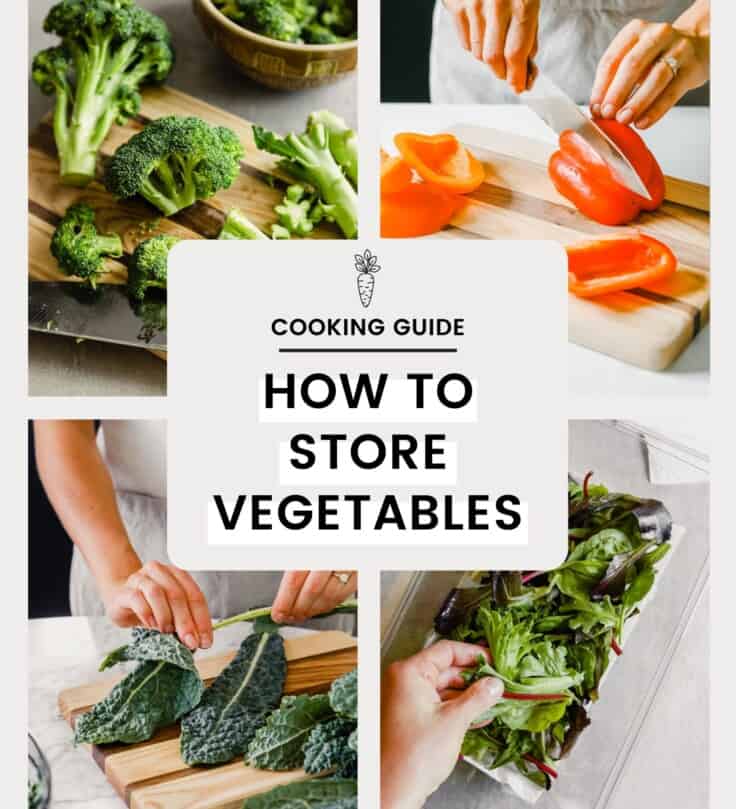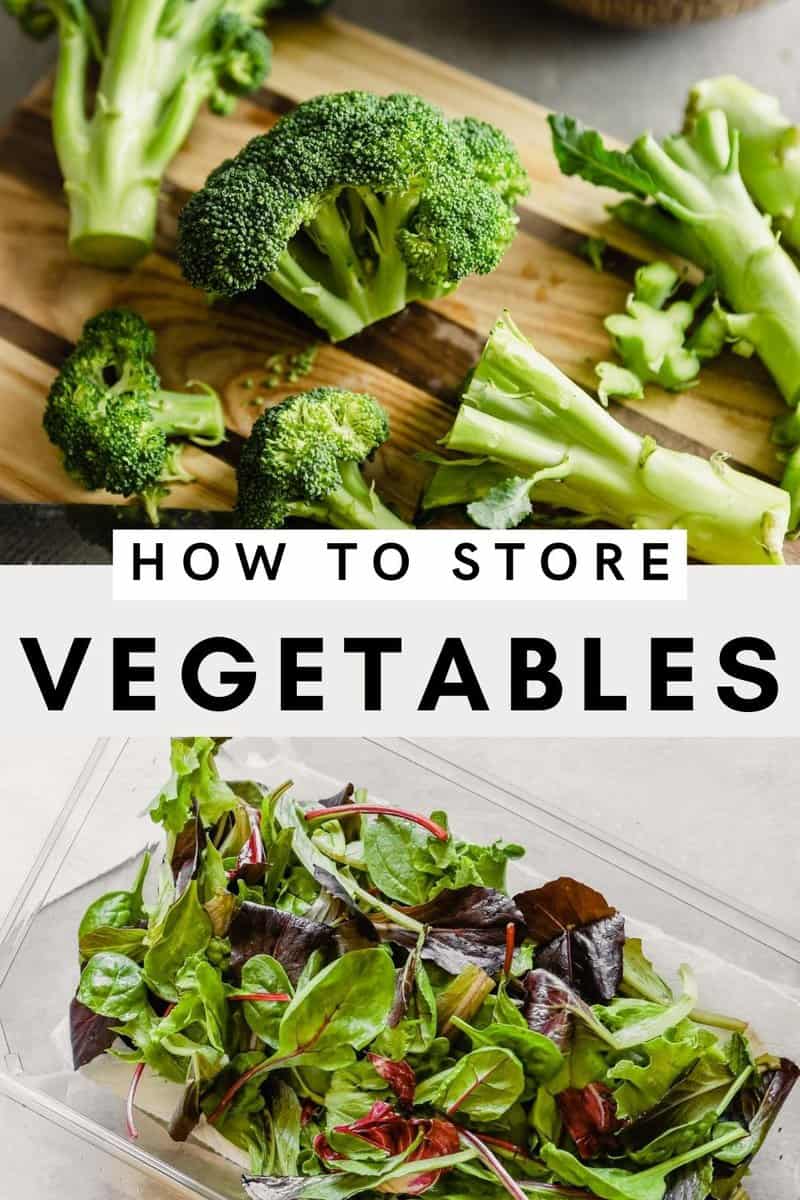We’ve all experienced the exasperation of purchasing fresh produce only to find it wilted, rotten, and forgotten in the back of the fridge, whoops! The way the produce is stored is likely the culprit. There’s more to storing vegetables than just purchasing greens and tossing them in the refrigerator’s crisper drawer and hoping they’ll stay fresh until you need them.
Whether you’re reading to learn how to make your veggies last longer or to make meal prep smoother, bookmark this tab so you can easily access this guide for how to best store your veggies.
From when to wash or when to cut your loss, this epic guide will give you the ins and outs of storing some of the most common veggies you can find.
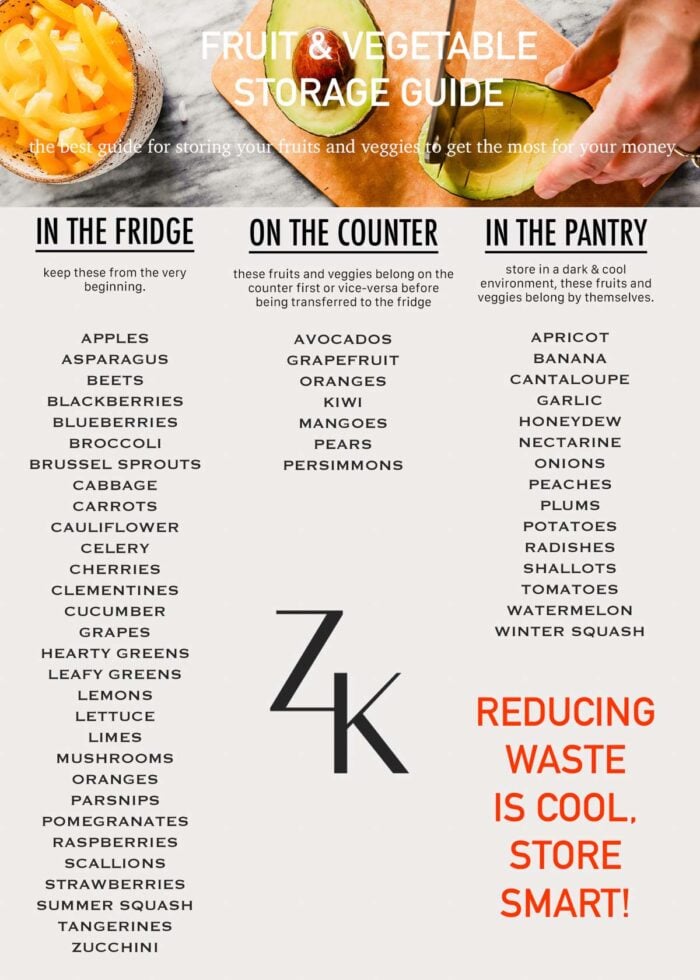
Store in the Fridge
Guide to what vegetables should be stored in the refrigerator.
- Asparagus
- Beets
- Broccoli
- Brussel sprouts
- Cabbage
- Carrots
- Cauliflower
- Celery
- Cucumber
- Hearty Greens
- Leafy Greens
- Lettuce
- Mushrooms
- Parsnips
- Scallions
- Summer Squash
- Zucchini
Store in the Pantry
Guide to what vegetables should be stored in mild temperatures and far from the fridge.
- Garlic
- Onions
- Potatoes
- Radishes
- Shallots
- Winter Squash
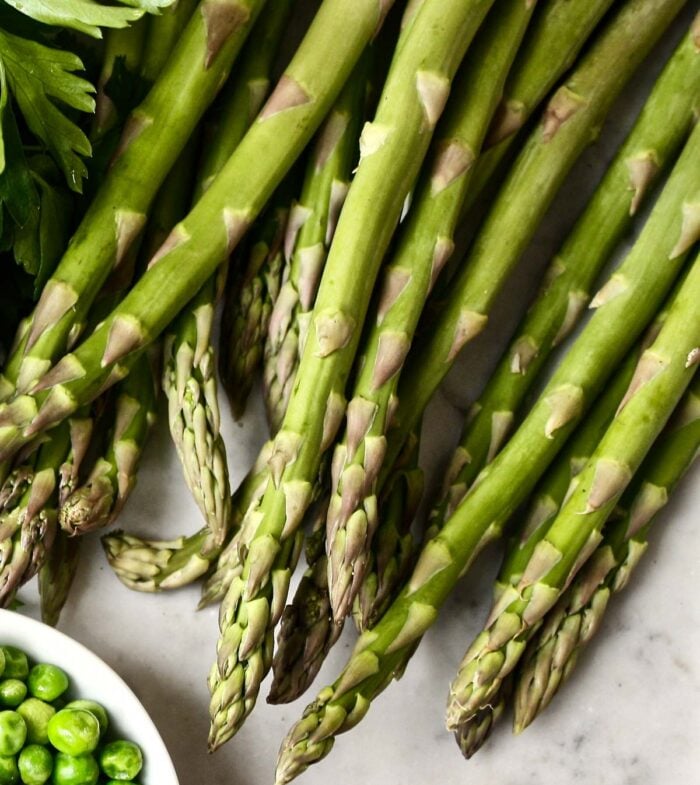
Asparagus
These stalks can quickly lose all of their necessary nutrients when not used shortly after their purchase. Trim the ends and set the spears upright in a jar filled halfway with water, loosely cover with a reusable produce bag (let’s do our part in putting a stop to plastic pollutants), and store in the refrigerator. Asparagus will last up to two weeks with proper handling.
Check out our Grilled Balsamic Glazed Salmon with Asparagus for inspiration on how to cook asparagus.
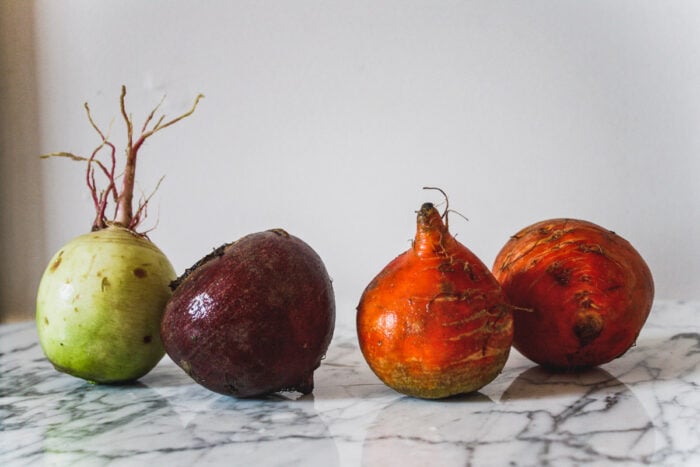
Beets/Carrots/Parsnips
This trio should find its way into your refrigerator’s crisper drawer upon arrival. Stored this way, beets, carrots and parsnips can stay fresh anywhere from three to four weeks (if your stomach doesn’t find them first!).
Check out our Roasted Beets & Carrots with Toasted Cumin Vinaigrette recipe for inspiration on how to cook beets and carrots in a dish together.
If you’ve got some parsnips and even more carrots lying around check out our Roasted Root Vegetables & Sorghum Pilaf with Tahini Sauce recipe.
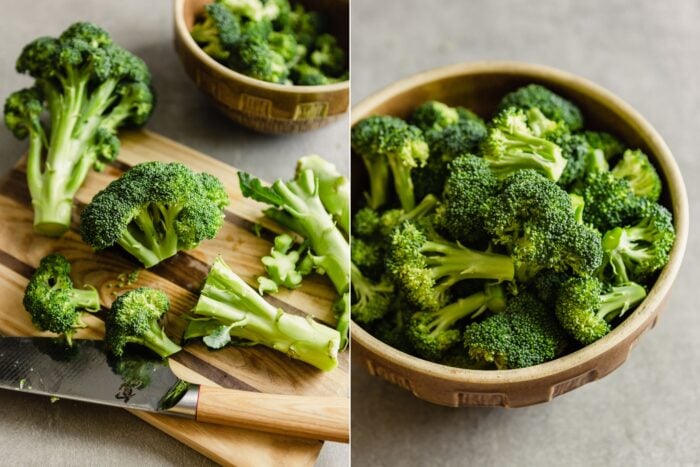
Broccoli/Brussels Sprouts/Cabbage/Cauliflower
These folks are family and rich in essential nutrients, including vitamin C. All of these should be stored in the coolest part of your refrigerator. Broccoli and Brussels sprouts will last up to two weeks, while cabbage can last up to three weeks.
Got some brussel sprouts laying around and are lacking inspiration? Give our Roasted Brussels Sprouts Caesar Salad recipe a try.
We love incorporating broccoli into quiches, grain bowls, and salads. But some other broccoli recipes to try include our Sautéed Broccoli and Broccoli Salad.
Or give this Bang Bang Cauliflower recipe a go to get the best tasting faux chicken nuggets there are!
Celery
The biggest trick to storing the beloved bloody mary stir stick is keeping it hydrated. First, use aluminum foil to wrap your celery bundle into a tight and tidy bundle, but avoid crimping the edges to allow the ethylene gas to escape (gotta have that air circulation!).
Stored this way in a fridge, celery should last approximately three weeks.
Make use of fresh celery in my Wild Rice Stuffing, it makes a great side dish!
If you love the flavor of celery, give celery root a try in this recipe for Creamy Celery Root & Parsnip Mash, a modern, and more flavorful, take on classic mashed potatoes.
Cucumber/Summer Squash/Zucchini
What do cucumber, summer squash and zucchini all have in common? They’re treated as vegetables in cooking but are actually fruits! With that being said, they’ve found their way onto this particular guide due to their traditional uses in everything from pasta, fries, salads and more.
To store cucumber, summer squash and zucchini, loosely wrap them in a reusable wrap (like beeswax wraps, cloth, or silicon reusable sandwich bags) before storing them in the crisper drawer for up to two weeks.
For a light cucumber dish that makes for a great side dish give this Modern Creamy Cucumber Salad a go.
And for something sweet, give this Healthy Lemon Poppy Seed Zucchini Bread a try, it’s a fan favorite!
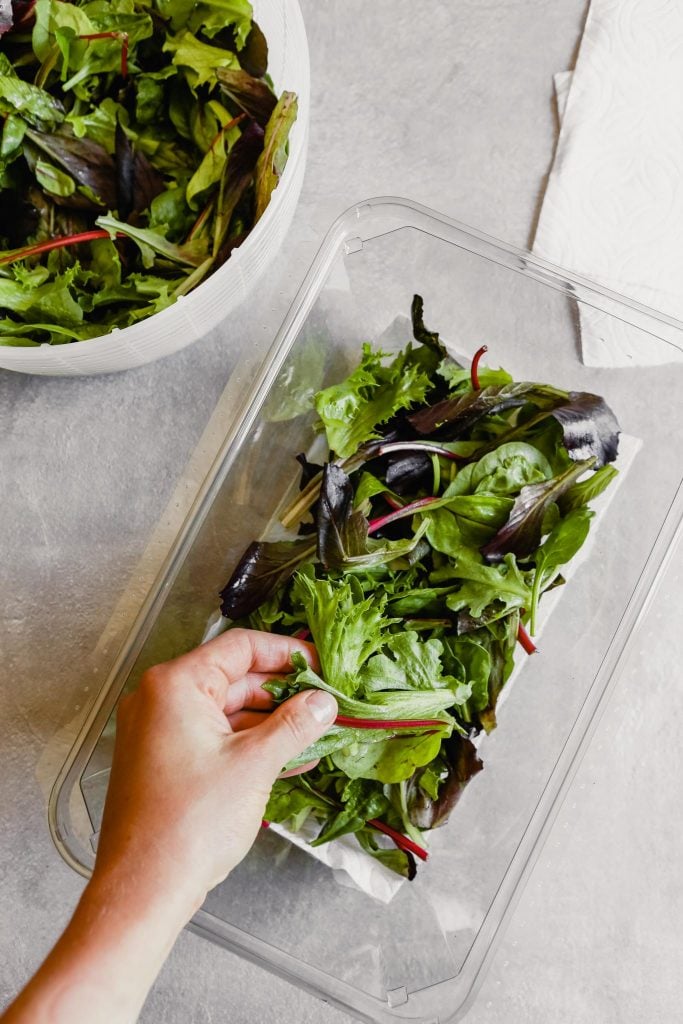
Leafy Greens/Lettuce/Hearty Greens
Hearty lettuce including romaine, romaine hearts and iceberg lettuce will easily last a week (or more) when stored inside produce bags and placed in the crisper drawer. For lighter leaves (spinach and arugula) and hearty greens (kale and Swiss chard), a quick rinse and dry before storing is recommended. Rinse and spin dry with a salad spinner. This is a must to avoid rot, so if you haven’t already invested in this awesome kitchen equipment, here’s your sign!
However, if it’s not in the budget, place washed greens in a clean kitchen towel, wrap lightly and shake/pat against the counter to dry. Layer washed and dried greens between paper towels in a reusable airtight container and place in the fridge. Stored this way, fresh greens can last just over one week. When properly cared for and cleaned, lettuce will increase in longevity.
This method is two fold—not only will the greens stay fresh longer, but they’re ready to eat whenever you are, which means you’re more likely to eat them!
This recipe for Blueberry Salad with Lemon Vinaigrette is the perfect way to use up leftover greens.
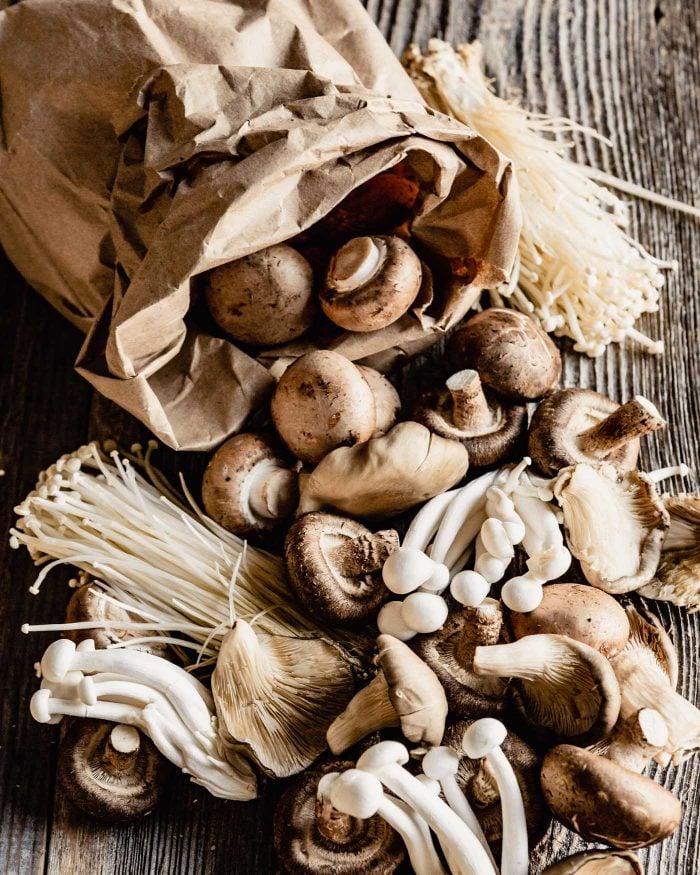
Mushrooms
The best way to get great mushrooms is to invest in loose mushrooms rather than a pre-packaged plastic-wrapped selection. When buying loose mushrooms, you should store them in a reusable and sealable bag. Leave the bag partially open to prevent these fungi from drying out.
If you’ve got a pack of pre-packaged mushrooms on hand simply leave them in the original container and reseal after removing a portion of contents. Stored this way, mushrooms should last one week in the fridge.
Get the picture-perfect pasta with our Black Truffle Pasta with Shiitake Mushrooms plus it tastes great too!
Or try this Hungarian Mushroom Soup it’s one of my most popular recipes to date!
Scallions
Wrap scallions (green onions and spring onions) in a lightly dampened paper towel and seal in a reusable bag. Place in the crisper drawer for up to two weeks. Unlike others in the onion family, scallions should indeed be refrigerated in order to prevent a premature passing.
This Ginger Scallion Sauce is the perfect dressing for rice noodles, ramen noodles, cod, salmon, shrimp, crab, halibut, scallops, rice, chicken, pork, beef and even in soup.
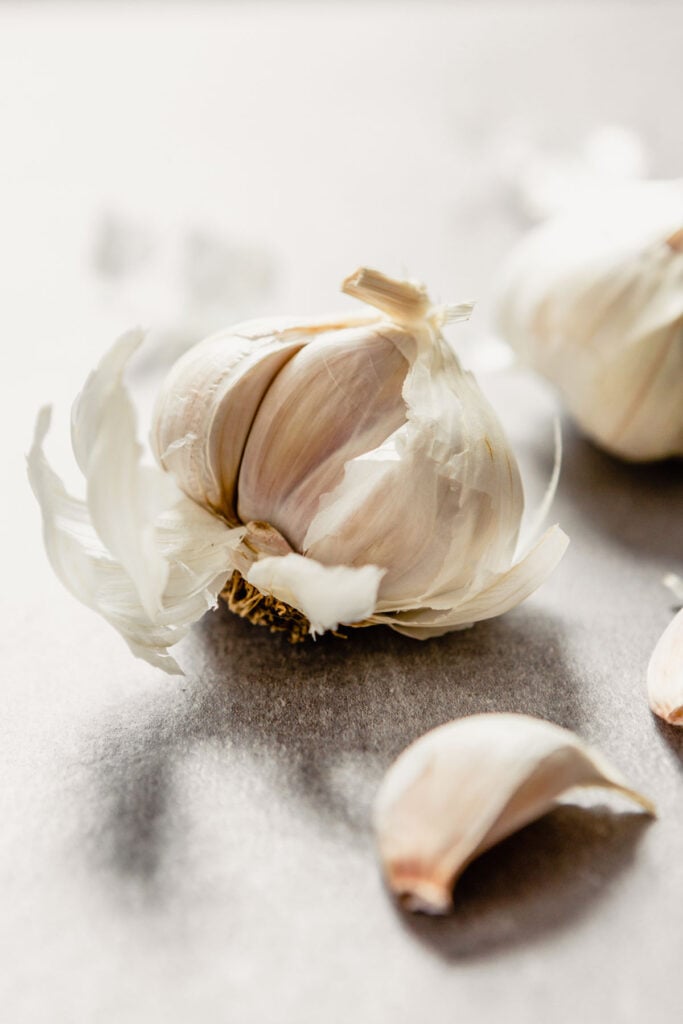
Garlic, Onions, Shallots
These go-to cooking staples are surprisingly easy to store. When stored in a cool dark place, such as a pantry or a cupboard, shallots will last up to one month, while onion and garlic can last up to two months with ease. Once any of these ingredients are cut into, they should be stored in the refrigerator in reusable sealable produce bags and used within five days.
A simple yet refreshing side takes the stage with this Quick Pickled Red Onions recipe, garlic is optional though does add additional flavor.
Potatoes (regular & sweet)
Ah, the holy grail of starch. These bad boys make the perfect addition to almost every dish and (I’m a sucker for the perfect french fry). Potatoes require a cool, dark place for storage. Regular potatoes will last one month, while sweet potatoes will last approximately three weeks.
Be careful not to forget them for too long as potatoes can begin to sprout and experts do not recommend consumption from there on after. Use your best judgment to decide whether or not merely removing sprouts, eyes, green skin, and all of the bruised parts are worth the risk.
Stuffed Sweet Potatoes with Avocado Green Goddess Dressing makes for a tasty and healthy meal packed with plenty of wholesome ingredients.
Plain potatoes take on tons of flavor in our Creamy Mashed Celery Root & Potatoes with Chives recipe.
Radishes
Wrap radishes in a paper towel in a sealable bag leaving it ever so slightly unfastened to help with airflow. Radishes will last up to one month when stored like this but are at their best when eaten within the first two weeks of purchase.
Enjoy the delightful crunch of fresh radishes in this Salmon Cake Niçoise Salad or this delicious spring Smoked Trout Salad.
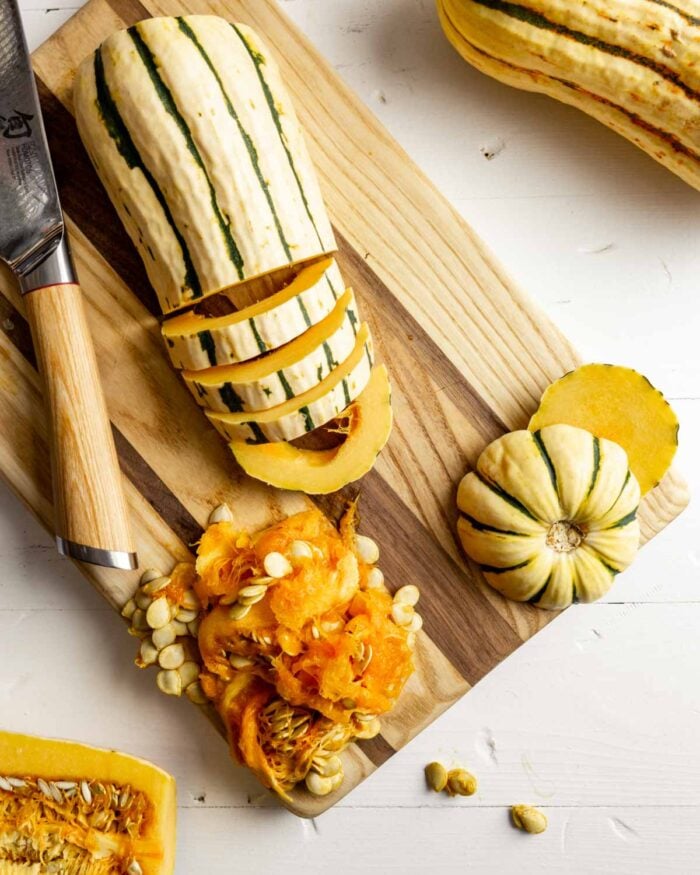
Winter Squash
Unlike their sibling Summer squash, Winter squash should be stored in a cool, dry and dark place rather than the refrigerator. In storage, they will last up to three weeks. However, once cut, they should be transferred to the fridge in order to last up to one week. Though Winter squash is “technically” a fruit, it’s more commonly used in dishes as a vegetable.
This Roasted Delicata Squash with Maple Browned Butter Sauce gives me all the fall vibes.
How to Freeze Vegetables
Guide to what vegetables can be stored in the frigid freezer and used later.
Generally speaking, most veggies, both raw and cooked, can be stored in the freezer for later use.
How to freeze raw produce
Wash and prep the produce as desired (trim green beans, peel and cube winter squash, dice carrots) and arrange in a single layer on a parchment-lined baking sheet. Freeze vegetables until solid, then transfer to a resealable zipper-lock bag and store in the freezer until needed.
Check out my complete guide on how to create a Sweet Potato Purée with freezing information.
Bear in mind, freezing raw vegetables will alter their texture, so only freeze vegetables that you intend to use in soups, smoothies, or braises.
How to freeze cooked vegetables
For roasted, steamed, or sautéed vegetables.
Arrange cooked and cooled vegetables on a parchment-lined baking sheet and freeze until solid. Transfer frozen vegetables to a resealable zipper-lock bag and store them in the freezer until needed. Reheat cooked vegetables in a 350-degree oven, or on the stovetop. Freezing pre-cooked vegetables will slightly alter their texture, but not enough that you can’t reheat and enjoy them.
If you’re in the food-saving mood, check out my how-to guides for freezing fresh oranges, rhubarb and strawberries!
These are merely guidelines on what the average lifespan of vegetables can be when stored properly. This is not a guarantee—place of purchase, temperature, location of storage, and type of storage can all impact when a vegetable spoils.
Always trust your gut or, better yet, all five senses when examining whether or not a product has surpassed its best if used by date. When in doubt, toss it out!
Reducing food waste is cool, so store smart! 🥦
